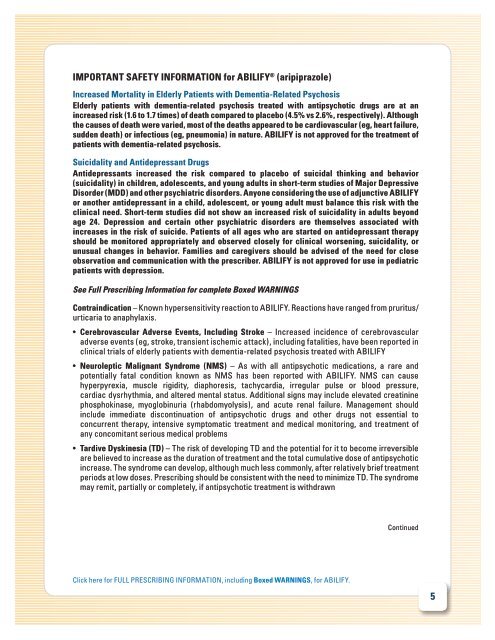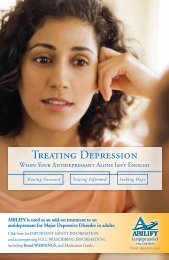APA Practice Guideline for the Treatment of Major Depressive - Abilify
APA Practice Guideline for the Treatment of Major Depressive - Abilify
APA Practice Guideline for the Treatment of Major Depressive - Abilify
Create successful ePaper yourself
Turn your PDF publications into a flip-book with our unique Google optimized e-Paper software.
IMPORTANT SAFETY INFORMATION <strong>for</strong> ABILIFY ® (aripiprazole)<br />
Increased Mortality in Elderly Patients with Dementia-Related Psychosis<br />
Elderly patients with dementia-related psychosis treated with antipsychotic drugs are at an<br />
increased risk (1.6 to 1.7 times) <strong>of</strong> death compared to placebo (4.5% vs 2.6%, respectively). Although<br />
<strong>the</strong> causes <strong>of</strong> death were varied, most <strong>of</strong> <strong>the</strong> deaths appeared to be cardiovascular (eg, heart failure,<br />
sudden death) or infectious (eg, pneumonia) in nature. ABILIFY is not approved <strong>for</strong> <strong>the</strong> treatment <strong>of</strong><br />
patients with dementia-related psychosis.<br />
Suicidality and Antidepressant Drugs<br />
Antidepressants increased <strong>the</strong> risk compared to placebo <strong>of</strong> suicidal thinking and behavior<br />
(suicidality) in children, adolescents, and young adults in short-term studies <strong>of</strong> <strong>Major</strong> <strong>Depressive</strong><br />
Disorder (MDD) and o<strong>the</strong>r psychiatric disorders. Anyone considering <strong>the</strong> use <strong>of</strong> adjunctive ABILIFY<br />
or ano<strong>the</strong>r antidepressant in a child, adolescent, or young adult must balance this risk with <strong>the</strong><br />
clinical need. Short-term studies did not show an increased risk <strong>of</strong> suicidality in adults beyond<br />
age 24. Depression and certain o<strong>the</strong>r psychiatric disorders are <strong>the</strong>mselves associated with<br />
increases in <strong>the</strong> risk <strong>of</strong> suicide. Patients <strong>of</strong> all ages who are started on antidepressant <strong>the</strong>rapy<br />
should be monitored appropriately and observed closely <strong>for</strong> clinical worsening, suicidality, or<br />
unusual changes in behavior. Families and caregivers should be advised <strong>of</strong> <strong>the</strong> need <strong>for</strong> close<br />
observation and communication with <strong>the</strong> prescriber. ABILIFY is not approved <strong>for</strong> use in pediatric<br />
patients with depression.<br />
See Full Prescribing In<strong>for</strong>mation <strong>for</strong> complete Boxed WARNINGS<br />
Contraindication – Known hypersensitivity reaction to ABILIFY. Reactions have ranged from pruritus/<br />
urticaria to anaphylaxis.<br />
• Cerebrovascular Adverse Events, Including Stroke – Increased incidence <strong>of</strong> cerebrovascular<br />
adverse events (eg, stroke, transient ischemic attack), including fatalities, have been reported in<br />
clinical trials <strong>of</strong> elderly patients with dementia-related psychosis treated with ABILIFY<br />
• Neuroleptic Malignant Syndrome (NMS) – As with all antipsychotic medications, a rare and<br />
potentially fatal condition known as NMS has been reported with ABILIFY. NMS can cause<br />
hyperpyrexia, muscle rigidity, diaphoresis, tachycardia, irregular pulse or blood pressure,<br />
cardiac dysrhythmia, and altered mental status. Additional signs may include elevated creatinine<br />
phosphokinase, myoglobinuria (rhabdomyolysis), and acute renal failure. Management should<br />
include immediate discontinuation <strong>of</strong> antipsychotic drugs and o<strong>the</strong>r drugs not essential to<br />
concurrent <strong>the</strong>rapy, intensive symptomatic treatment and medical monitoring, and treatment <strong>of</strong><br />
any concomitant serious medical problems<br />
• Tardive Dyskinesia (TD) – The risk <strong>of</strong> developing TD and <strong>the</strong> potential <strong>for</strong> it to become irreversible<br />
are believed to increase as <strong>the</strong> duration <strong>of</strong> treatment and <strong>the</strong> total cumulative dose <strong>of</strong> antipsychotic<br />
increase. The syndrome can develop, although much less commonly, after relatively brief treatment<br />
periods at low doses. Prescribing should be consistent with <strong>the</strong> need to minimize TD. The syndrome<br />
may remit, partially or completely, if antipsychotic treatment is withdrawn<br />
Continued<br />
Click here <strong>for</strong> FULL PRESCRIBING INFORMATION, including Boxed WARNINGS, <strong>for</strong> ABILIFY.<br />
5



